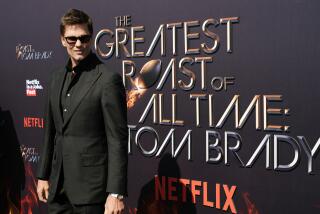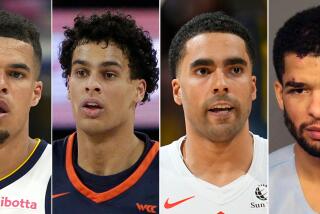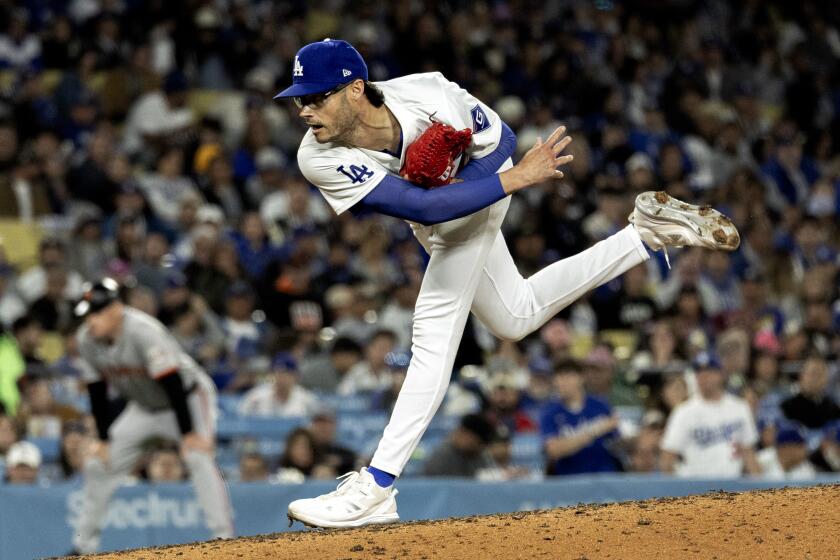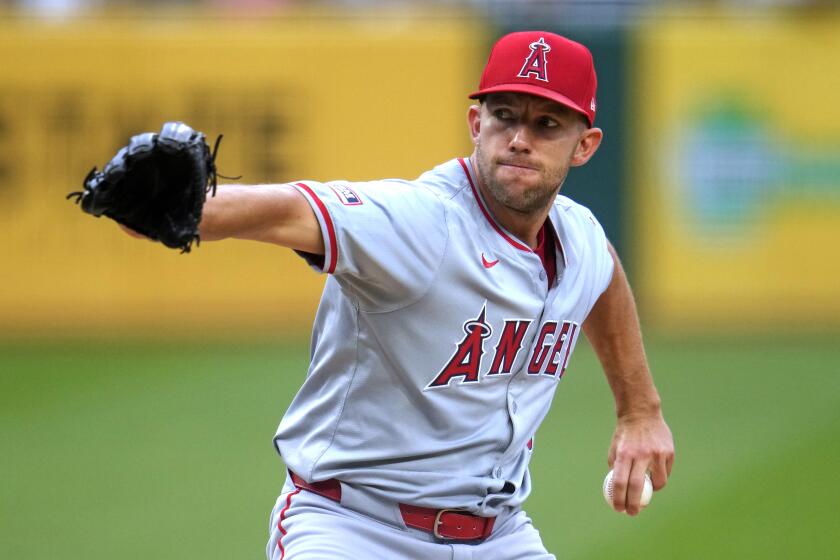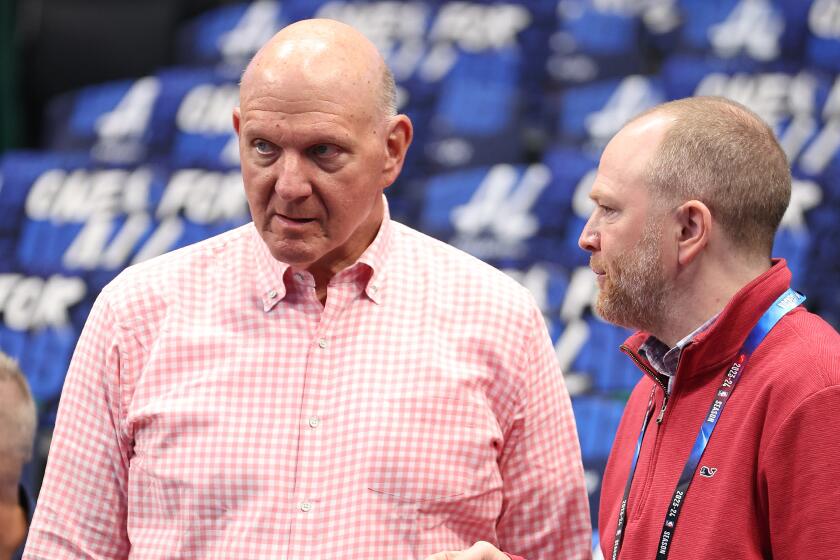Dominguez Gets Into Import Business : Valley Artist Has Become Agent for Baseball Stars Defecting From Cuba
Gus Dominguez, the artist, never pictured this.
For seven years, he drew sketches from blueprints that aerospace engineers brought into his office.
Then he started his own consulting firm, acting as a free-lance art director on advertising projects for several large corporations.
Now he has entered another business, one which Dominguez says allows him to blend his promotional flair with his primary personal interest.
He is a baseball agent.
Try to connect the dots on that one.
With partners Steve Schneider, a Beverly Hills-based arbitration attorney, and Ron Cey, former third baseman for the Dodgers, Dominguez has formed Total Sports International. The fledgling agency advises 11 baseball players--eight of whom were selected in this month’s amateur draft.
Dominguez, 34, is a Cuban immigrant who pitched in high school and college in the San Fernando Valley before arm problems ended his playing days. He may only be a rookie in his new vocation, but he quickly could become an impact player.
TSI already has a well-developed Cuban connection, starting with its first client, St. Louis Cardinals’ pitcher Rene Arocha. With the potential of more Cuban players coming to the United States, either by defecting or being sold to U.S. teams by their government, Dominguez’s group seems poised for a rapid rise.
Arocha, a former Cuban national team member and a celebrated defector, receives partial credit for founding TSI. When he slipped away from his Cuban teammates at the Miami International Airport in July, 1991, Dominguez was among the first people he met.
Dominguez happened to be in the area on a tour promoting a new candy bar named after Jose Canseco, the Cuban-born, then-Oakland A’s slugger who lives in Miami.
Arocha said a friendship was struck almost immediately.
“I saw his sincerity and how much he wanted to help,” Arocha said from his home in St. Louis, with his American wife, Vivian, translating. “His interest got to me. I trusted him.”
Dominguez said his knowledge of Cuban athletes and his respect for their plight helped form the foundation for his relationship with Arocha.
“I do not see them as Communists and part of the Cuban propaganda machine,” Dominguez said. “I see them as Cubans first and baseball players second. That is it. Sports and politics do not mix well.”
Arocha, who, like Canseco, was born in the Havana suburb of Regla, was invited to Oakland to meet A’s representatives and see a game. A few days later in Los Angeles, arrangements were made for the 27-year-old right-hander to meet with one of baseball’s high-powered sports agents.
However, the agent canceled the appointment at the last minute, saying more important business needed his attention.
Arocha was furious.
So, too, was Dominguez--until Arocha surprised him with a sudden question. “Say, why don’t you help me?” he inquired.
After a mild attempt to explain that he lacked the requisite experience, Dominguez agreed to try.
“You do the best you can,” Arocha told Dominguez. “We will learn together.”
Dominguez’s first step was to solicit advice from agents and people already established in baseball. His initial challenge was to persuade the commissioner’s office to grant Arocha free agency, which would allow him to sign a contract with the club of his choice.
Instead, then-Commissioner Fay Vincent scheduled a special lottery for September, 1991. Teams interested in negotiating with Arocha were required to participate in a drawing. The winner of the lottery held rights to Arocha until the following June’s draft.
St. Louis won the lottery, and it took only two weeks for Arocha to sign a contract. Then 25, and with a need to establish himself quickly, he had little negotiating leverage.
Terms of the deal were not disclosed, but Dominguez said, “Under the circumstances, with his age and the timetable we were on, we got a fair amount. Rene was happy with it, and we were happy with it.”
Arocha’s deal has been a Cardinals’ steal.
After a winter of pitching in Arecibo, Puerto Rico, Arocha was assigned last spring to Louisville, the Cardinals’ triple-A affiliate in the American Assn. He spent all of last season with Louisville, finishing with a 12-7 record, 2.70 earned-run average, and was voted the league’s most valuable pitcher.
For the Cardinals this season, one in which he is earning the major league minimum of $109,000, Arocha is 6-2 with a 3.07 ERA, tied for 10th-best among National League starters.
“We are talking about a guy who is not your typical rookie,” Dominguez said. “To him, pitching in front of 50,000 is nothing. He is used to crowds like that. There is no pressure. In Cuba, players ride home on the same bus as the fans. That is pressure. If you pitch a bad game, they are going to get you for it.”
Dominguez estimates Arocha, who made $30 per month playing in Cuba, today would be worth $1 million per season if he could negotiate on an open market. However, he is ineligible for arbitration until the conclusion of the 1994 season under terms of baseball’s collective bargaining agreement.
Even then, Arocha will have arbitration rights only if he is considered among the top 17% in the league at his position.
Already, Arocha is considered a winner on the field and at the box office. He is particularly popular among the large Cuban population in southern Florida.
On Wednesday night, a crowd of 37,936 in Miami cheered every time his name was announced as he pitched against the Marlins in the finale of a three-game series. He beat the Marlins, 4-3, and drove in two runs with his first major league hit.
“Rene is a bigger name in Florida than any Cuban athlete is, including Jose (Canseco),” Dominguez said. “It is a political thing, too. He slapped old Fidel (Castro) in the face.”
Arocha was the first Cuban baseball player to defect in 31 years. But he was not the last.
In October, 1992, Ivan Alvarez, Alexis Cabreja and Osmani Estrada left the Cuban team while on a trip in Mexico. They, too, are now represented by Dominguez and TSI.
Alvarez, 23, a pitcher, was selected in the ninth round in June by the San Francisco Giants. Estrada, 24, a third baseman, and Cabreja, 24, an outfielder, were chosen by the Texas Rangers in the 12th and 14th rounds. All three have signed contracts.
Dominguez believes Alvarez might someday be better than Arocha. “With work, he can get to where I am right now,” Arocha said.
So why was he drafted so late? Perhaps because professional scouts are reluctant to give Cuban players the respect they feel they deserve.
“It was the same with Rene,” Dominguez said. “When he was trying out, they said he was not throwing hard enough. They said the same thing when he was pitching in Puerto Rico. There is always an excuse.”
Arocha was not even the best pitcher on the Cuban national team. He would have been fourth or fifth in the team’s pitching rotation, Dominguez said.
More Cuban players are expected to attempt defections in the future now that Arocha has set a precedent.
“Most of the players believed the propaganda, that they would not be treated well and they would be taken advantage of in the U.S.,” Dominguez said. “It is such a big thing put into their heads. We are like the Big Bad Wolf over here.
“Knowing Rene has made it gives everyone else some hope.”
If Castro’s government eventually allows players to be sold to U.S. professional teams, baseball could be flooded by Cuban prospects.
Dominguez, instead, hopes the current trend continues. A flood of players might threaten his budding monopoly. “I can control it better this way,” he said. “If it opens up, a lot of other agents will try to get involved--people who are not as well prepared as we are.”
In the meantime, Dominguez is attempting to strengthen his ties to the San Fernando Valley Latino baseball community. Roland De La Maza, a former St. Genevieve High and Cal State Sacramento pitcher and a 14th-round choice of the Cleveland Indians earlier this month, is of Cuban descent and another TSI client.
“We don’t want to be only Hispanic and Latino representatives, but we do think there is a need for one,” Dominguez said.
Dominguez believes his new business marks the culmination of a natural progression. A man’s profession can vary; his passion remains constant.
Baseball was a first love, the game itself tugging at the root of his existence. He was born in Cuba, where baseball is less a pastime than it is a national treasure.
By the time the family fled the Castro regime and settled in Panorama City in 1967, Dominguez brought with him a fervent affection for the sport.
Dominguez played baseball at Monroe High, posting a 7-2 record, including a no-hitter, as a senior in 1976. He went to Valley College, where he became an All-Metro Conference relief pitcher for Coach Dave Snow. As a sophomore, Dominguez had a 5-1 record and a 1.91 earned-run average. It was his last hurrah.
At Cal State Northridge, where he played in 1979-80, Dominguez experienced recurring elbow problems and rarely pitched. “My fastball went south and that was it for baseball,” he said.
Until now.
“All these years I have been frustrated because I have not been involved,” he said. “If I could not be as a player, I wanted to as an agent.”
So far, Dominguez’s work has not netted him a dime. He did not receive a cut of Arocha’s first major league contract. However, he will receive a share of money made on Arocha’s endorsements of Nike and Louisville Slugger.
“We got into this to help these guys,” Dominguez said. “If I make money, great. If I don’t, then I’m still involved in what I like to do.”
Being Arocha’s agent has been a taxing but enjoyable task.
“It has been interesting,” Dominguez said. “A lot of times in life, coincidence, or just being in the right place at the right time, means a career.
“Someday I hope we can look back and say, ‘Were we lucky, or what?’ ”
More to Read
Get our high school sports newsletter
Prep Rally is devoted to the SoCal high school sports experience, bringing you scores, stories and a behind-the-scenes look at what makes prep sports so popular.
You may occasionally receive promotional content from the Los Angeles Times.
